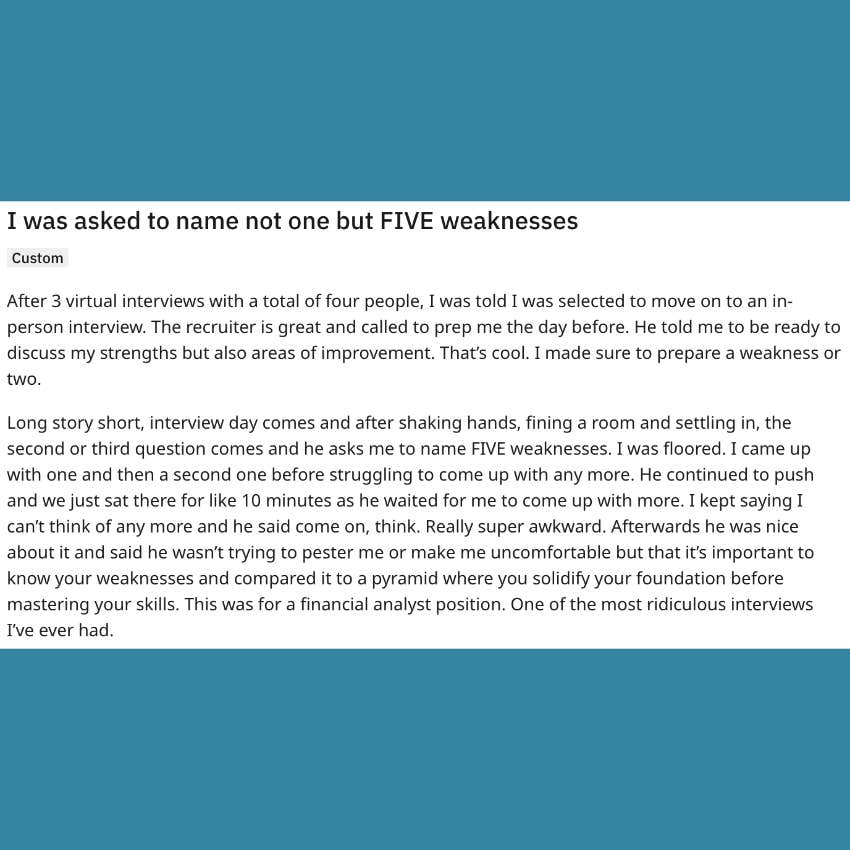Man Is Floored When Asked To Name 5 Weaknesses During A Job Interview — 'I Couldn't Think Of Any More'
Coming up with one is hard enough, but five? Impossible.
 Canva Pro; NoSystem images from Getty Images Signature
Canva Pro; NoSystem images from Getty Images Signature One of the most difficult and dreaded job interview questions is "What do you consider your greatest weakness?" We all know the secret to answering this question is to be honest and vulnerable while framing a negative as a potential positive without being too obvious — and that is not an easy feat.
Now, imagine you're headed into a job interview, the weakness question prepped with a stellar answer, and instead of asking for your greatest weakness, the recruiter asks you for five weaknesses. That's exactly why one man turned to Reddit to vent his frustrations after he was blindsided when the recruiter asked him to come up with five weaknesses on the spot.
During his fourth interview with the same company, a man was unprepared after being asked to come up with five personal weaknesses.
Before the interview, the recruiter called him to lay the groundwork for his in-person meeting, which he greatly appreciated. "The recruiter is great and called to prep me the day before," he said.
He even got a heads up during that phone call that he should be prepared to answer questions about what areas he was strong in versus those that could use a little improvement. In light of that insight, he came up with what he thought were a couple of good responses.
Feeling comfortable after making it through three virtual interviews, the inquiry about his weaknesses came up as expected, but he had prepped for two and definitely not five.
He confidently tossed out his two ready-made answers, then racked his brain but couldn't come up with more.
Try as he might, the man just could not think of three additional weaknesses on the spot. To make the situation much more awkward, the interviewer continued pursuing additional responses for nearly 10 minutes without moving on. "Really, super awkward," he recalled.
 Photo: Reddit
Photo: Reddit
The interviewer seemed understanding afterward and apologized if the question was uncomfortable, but justified it by explaining that those weaknesses are like a "pyramid where you solidify your foundation before mastering your skills."
Clearly unimpressed, the applicant confessed that this was "One of the most ridiculous interviews I’ve ever had."
The question about your weaknesses can make or break your candidacy.
Although the weaknesses question can seem like a ploy to throw a wrench in an otherwise polished interview, it is actually an opportunity that, when answered correctly, can give you a leg up on the competition.
Harvard Business Review explains that the purpose of this question has nothing to do with weaknesses at all. It has to do with learning about who you are as a person. That means, choose real weaknesses, but frame them as "challenges," and pick easily quantifiable difficulties that can be improved on with repetition or instruction.
One so-called weakness that can easily have a positive spin is knowing when to ask for help. It's a flaw, but also a trait that shows honesty. It's also something that can easily be improved upon.
Think about your answer strategically, not as an opportunity to pour out your problems to a potential employer, however. Just as there are better ways to answer this question, there are some responses that aren't going to serve you well.
For example, never say that you have no flaws. The hiring manager is well-aware that no one is perfect — it will come across as disingenuous. "I'm a perfectionist" and "I like to work around the clock" are overdone answers and insincere for the same reason.
Always put the emphasis on the positive aspect of your challenges and avoid negative terminology like "I can't" or "I failed." Talk about situations where you've acknowledged a weakness and talk about the steps you're taking to improve.
NyRee Ausler, SHRM-SCP, SPHR is a writer and author from Seattle, Washington. She covers workplace issues using the experience garnered over two decades of working in Human Resources and Diversity, Equity, and Inclusion.

